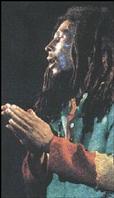|
Bob Marley and Marcus Garvey

Bob Marley and Marcus Garvey
“Emancipate yourself from mental slavery, none but ourselves can free our mind” Marcus Garvey Most people who have listened to the music of Bob Marley will agree that his seminal work was the song “Redemption Song”. It is for this reason that most admirers of Marley are unaware that the seminal lyric in the song wasn’t written by Bob Marley but came out of the mind of the late great Marcus Mosiah Garvey.
Brief Biography of Marcus Garvey Marcus Mosiah Garvey was born in St.Anns Bay Jamaica on August 17, 1887. As he grew up he became acutely aware of the political situation facing black people in Jamaica. In 1910 the young Garvey went to Latin America and for the next few years went across the world working and experiencing the plight of black people everywhere. Garvey arrived back in Jamaica in July 15, 1914 and five days after established the Universal Negro Improvement Association and African Communities League.
Garvey stressed a philosophy termed “African Fundamentalism”, in which he called for the creation of a new Negro Spirit. This new Negro spirit called for the black man to recognize his roots in Africa. This new Negro Spirit sought to use the common experience of black people build a strong and healthy nation. It is within the context of building this nation that Garvey came up with the phrase “emancipate yourselves from mental slavery, none but ourselves can free our mind”.
Marcus Garvey and The Rastafari Religion It is out of Garvey’s philosophy that thinkers such as Leonard Howell, Ferdinand Ricketts and Joseph Hibbert emerge to create new religious and cultural movements,Rastafari. "It is based on the writings of Marcus Garvey that inspires the emergence of Rastafari". In particular the repeated statements by Garvey to “Look to Africa, when a black king shall be crowned, for the day of deliverance is near” were seen as prophetic when Haile Selassie was crowned in 1930. Haile Selassie’s title was Ras Tafari in addition to Lord of Lords, King of Kings and Conquering Lion of Judah all led to the belief that he was the reincarnation of god,the black Messiah,the Savior,the second coming of Jesus Christ. Bob Marley and Pan-Africanism In many instances the commercial success of Bob Marley in the international stage has clouded the pan-African agenda put forward by Marcus Garvey. The result of this commercialization has developed a pan-Africanism that has produced familiar slogans and rhetoric, while lacking the depth and insight needed for black people to forge forth a future in the 21st Century. Thus within this context Marley and Garvey represent two diametrically opposed figures, with the former representing a neo-spiritualist/integrationist school and the latter a nationalist school of thought.
When Bob Marley asks us to “emancipate ourselves from mental slavery” it does not have the same meaning when Garvey asks us to “emancipate ourselves from mental slavery”.
While Marley spoke of the need for us to “Chant Down Babylon” one has to seriously look at the symbolic nature of “Babylon”. The idea of “Babylon” used by Rastafari speaks to the biblical city known for its corruption and exploitation of people and its destruction by god. The concept is used to refer to any form of injustice and thus there is a universalism, which lacks historical and political specificity. Therefore Marley is able to “Chant Down Babylon” and call for “One Love” around the world and not be in philosophical contradiction. Thus Marley’s call for mental emancipation is not specific to the historical and political situation of black people but appeals to all people and races.
Garvey’s “emancipate yourself from mental slavery…” is a historical and politically specific call to black people to establish a new sense of self. The call was linked with the view on the part of Garvey that in order to revert the calamities of history the black man needed to engage in a critical transformation of the mind. The idea of mental emancipation was linked with Garvey’s political doctrine of ‘African Fundamentalism”. Garvey departs from the universalistic bent of Marley and engages in a discussion with black people.
Return from Marcus Garvey and Bob Marley to home of Rasta Man Vibration
•The Philosophy and Opinions of Marcus Garvey. Edited by Amy Jacques Garvey. 412 pages. Majority Press; Centennial edition, November 1, 1986 •Message to the People: The Course of African Philosophy by Marcus Garvey. Edited by Tony Martin. Foreword by Hon. Charles L. James, President General,UNIA •The Poetical Works of Marcus Garvey. Compiled and edited by Tony Martin. 123 pages. Majority Press, June 1, 1983.
Books
•Garvey and Garveyism,Garvey, Amy Jacques. London, England: Collier-MacMillan Ltd., 1963, 1968. •Marcus Garvey: Anti-Colonial Champion., Rupert Lewis. Trenton, NJ: Africa World Press, Inc., 1988. • Garveyism As A Religious Movement: The Institutionalization of A Black Civil Religion.Burkett, Randall K. Metuchen, NJ: Scarecrow Press and The American Theological Library Association, 1978. • Black Moses: The Story of Marcus Garvey and The Universal Negro Improvement Association.Cronon, Edmund David. Madison: University of Wisconsin Press, 1955, reprinted 1969.
|



